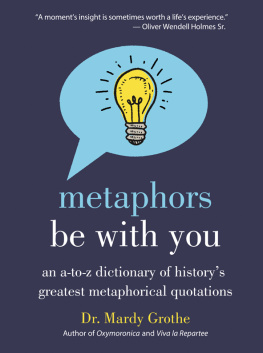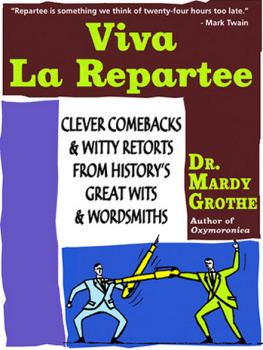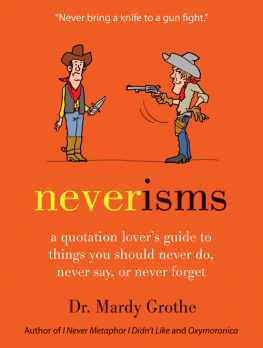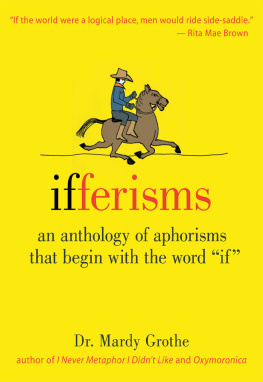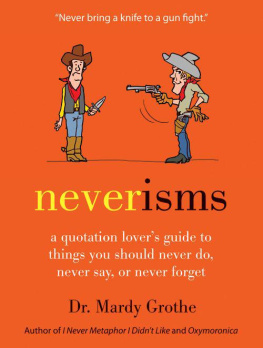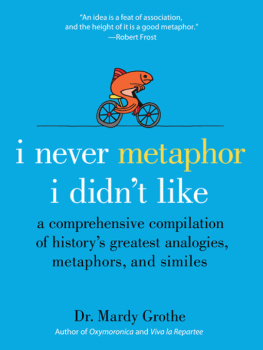By Dr. Mardy Grothe
M y son, Howard, and daughter, Annie, are full-time professional poker players who live and move and have their beings in that windowless, clockless pleasure dome known as Las Vegas. Its an easy lifeearning thousands of dollars in a single night just sitting around playing card games. But its a hard-knock life, too, what with the long, sedentary hours; the addictive behavior and secondhand smoke that suffuse the poker rooms; and the times when Lady Luck goes out whoring and your pocketbook and ego get roughed up. How best to catch and crystallize this collide-o-scopic life my children lead, this life of gorgeous poker rooms and hearts of darkness, of Euclidean clarity and survival of the meanest? Bob Silver Eagle Thompson, tournament director of the World Series of Poker at Binions Horseshoe casino, said it best: Poker is a tough way to make an easy living. Thats a paradox, a statement that seems absurd or self-contradictory but that, as Mardy Grothe illuminates in what you are about to read, turns out to be true.
Paradox is a particularly powerful device to ensnare truth because it concisely illuminates the contradictions that are at the very heart of our lives. It engages our hearts and minds because, beyond its figurative employment, paradox has always been at the center of the human condition. Mans real life, wrote Carl Jung, consists of a complex of inexorable oppositesday and night, birth and death, happiness and misery, good and evil. If it were not so, existence would come to an end. Paradox was a fact of life long before it became a literary and rhetorical device. Who among us has not experienced something ugly in everything beautiful, something true in everything false, something female in everything male, or, as King Claudius says in Shakespeares Hamlet , mirth in funeral and dirge in marriage? What you are about to read is the quintessential collection of memorable, push-me-pull-you, yin-yang statements.
Mardy Grothe has labored lovingly in the word yards of paradoxology to show us that we are, to borrow two lines from Alexander Popes Essay on Man, Sole judge of Truth, in endless Error hurled: The glory, jest, and riddle of the world! As youglory, jest, and riddlefeast on the wise and witty examples and explanations in Oxymoronica , you will discover truths about your life that you did not know you knew.
O xymoronica? you might be thinking, Whats that? While you surely know what an oxymoron is, oxymoronica is probably a new word to you. You wont find it in any dictionary (at least not yet) because I came up with it only a few years ago. In coining oxymoronica , I was inspired by words you may know: Erotica. Literature or art that is intended to arouse sexual desire. Exotica.
Things that are curiously unusual or excitingly strange. Playing off these words, I use the word oxymoronica to describe quotations that contain incompatible or incongruous elements. Many examples of oxymoronica appear illogical or self-contradictory on the surface. But at a deeper level, they usually make a great deal of sense and are often profoundly true. When people are asked to describe an oxymoron , they almost always think of a contradiction in terms like jumbo shrimp, acting naturally, pretty ugly , or, according to some, military intelligence . Sometimes an oxymoron is neatly inserted into an observation, as when the actor Alec Guinness observed: Acting is happy agony.
Happy and agony are contradictory emotional states that simply dont go together, but Guinness links them in a way that captures one of the most important characteristics of the acting profession. Its a perfect oxymoronic observationfalse at a superficial level, true at a deeper one. The same may be said about a famous line from the actress Ava Gardner: I am deeply superficial. In normal discourse, deep is the opposite of superficial. But when Gardner links these two antonyms together, the marriage of opposites arrests our attention and tantalizes our thinking. The Polish writer Stanislaw Lec was thinking along the same lines when he once said of a peer: Even his ignorance is encyclopedic.
Lec was describing someone whose ignorance was so immense he could have called it vast. But he chose to call it encyclopedic, adding more pizzazz to his remark. Another example occurs in the Albert Camus observation: I love my country too much to be a nationalist. Camus is suggesting that an extreme love for ones countrywhich often goes by the name nationalism is not a good thing. His point is that he wouldnt want to do something so detrimental to a country he loves. All of these quotes contain a juxtaposition of opposing terms.
They may be described by the adjective oxymoronic because they are characterized by or related to the rhetorical figure called an oxymoron . The Oxford English Dictionary defines oxymoron this way: A rhetorical figure by which contradictory or incongruous terms are conjoined so as to give point to the statement or expression; an expression in its superficial or literal meaning self-contradictory or absurd, but involving a point . The word, which appears in English for the first time in 1640, has an interesting etymology. In ancient Greek oxus means sharp or pointed and moros means dull, stupid, or foolish. So oxymoron is itself an oxymoron, literally meaning a sharp dullness or pointed foolishness. Technically, the correct plural form of the word is oxymora , but so many people say oxymorons that (except for purists, pedants, and yours truly) it is now generally regarded as an acceptable usage.
The best examples of oxymoronica dont contain a simple contradiction in terms; they contain what might be described as a contradiction in ideas. Many oxymoronic observations stretch our minds and expand our thinking: Free love is too expensive. BERNADETTE DEVLIN Chivalry is the most delicate form of contempt. ALBERT GUERARD Melancholy is the pleasure of being sad. VICTOR HUGO The superfluous is the most necessary. VOLTAIRE Observations like these are usually called paradoxical , and all are consistent with one of the definitions of the word paradox : A statement that seems self-contradictory, false, or absurd but is nonetheless well-founded or true.
The word shows up for the first time in English in 1540, a hundred years before the appearance of the word oxymoron. Paradox also comes from two ancient Greek words, para meaning beyond and doxa meaning opinion. Literally, it means beyond opinion, but it originally conveyed the sense of being beyond the pale of current opinion or contrary to current thinking. In the early days, it had a negative connotation, suggesting something that was fantastically unbelievable or even heretical. Shakespeare used the word in this sense when he wrote in Othello , These are old fond paradoxes to make fools laugh i the alehouse. Over time, the word gradually took on todays more favorable connotationsomething that is true even though it may look false.
Many famous sayings in history fit under the umbrella of oxymoronica: Less is more. Coined by Robert Browning and popularized by the German-born American architect Ludwig Mies van der Rohe, nothing could be further from the literal truth. But when people use this expression, theyre not speaking logically, theyre using self-contradictory phrasing to describe an important principlekeeping things simple and avoiding unnecessary detail often improves things. Yes, one could say Simpler is better, but such a bland observation wouldnt attract our attention like Brownings more provocative observation. To grasp the meaning of oxymoronic and paradoxical observations, people must be able to engage in abstract thinking. If you ask a group of early-elementary-school students, What does less is more mean?, most of them wont know because theyre at an age when people tend to think concretely.


